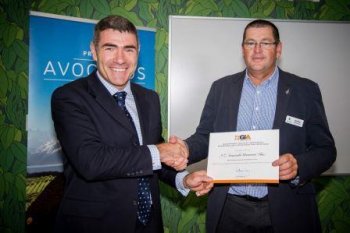
The signing was attended by the Minister for Primary Industries, Hon Nathan Guy, NZAGA Chair Ashby Whitehead, NZ Avocado CEO Jen Scoular, and representatives from the Ministry for Primary Industries (MPI), the GIA Secretariat and the avocado industry.
"Working in partnership with Government will enable us to deliver the best biosecurity outcomes that we can for the New Zealand avocado industry,” Whitehead says.
Avocados are New Zealand’s third largest fresh fruit export industry, with a Free on Board (FoB) value of $135M from sales to export markets and the New Zealand market in the 2014-15 season.
There are over 1300 avocado growers, with production spread across three main growing regions: Bay of Plenty (65%), Mid North (22%) and Far North (13%).
"Signing the GIA Deed will give the avocado industry the opportunity to influence how we are impacted in the event of a biosecurity response, and influence readiness activity,” Scoular says.
GIA Secretariat Manager, Steve Rich, welcomed New Zealand Avocado to the partnership saying the new addition will further strengthen efforts to better deliver biosecurity outcomes. "It’s pleasing to see more industry groups joining the growing partnership. GIA now has the critical mass to begin delivering improved biosecurity readiness and response activities. The development of the GIA partnership has taken time and great commitment from participants, but we are now beginning to see the benefits of the collective strength of participants working together to achieve common goals,” says Rich.
New Zealand Avocado joins Kiwifruit Vine Health, Pipfruit New Zealand, New Zealand Pork, New Zealand Equine Health Association, Onions New Zealand and the New Zealand Forestry Owners Association, along with MPI representing the government as GIA partners.
About Government Industry Agreement (GIA)
GIA operates as a partnership between industry and government to manage pests and diseases that could badly damage New Zealand's primary industries, our economy, and our environment. It aims to improve biosecurity outcomes and give everyone the confidence that the best decisions are being made.



 Classifieds
Classifieds

